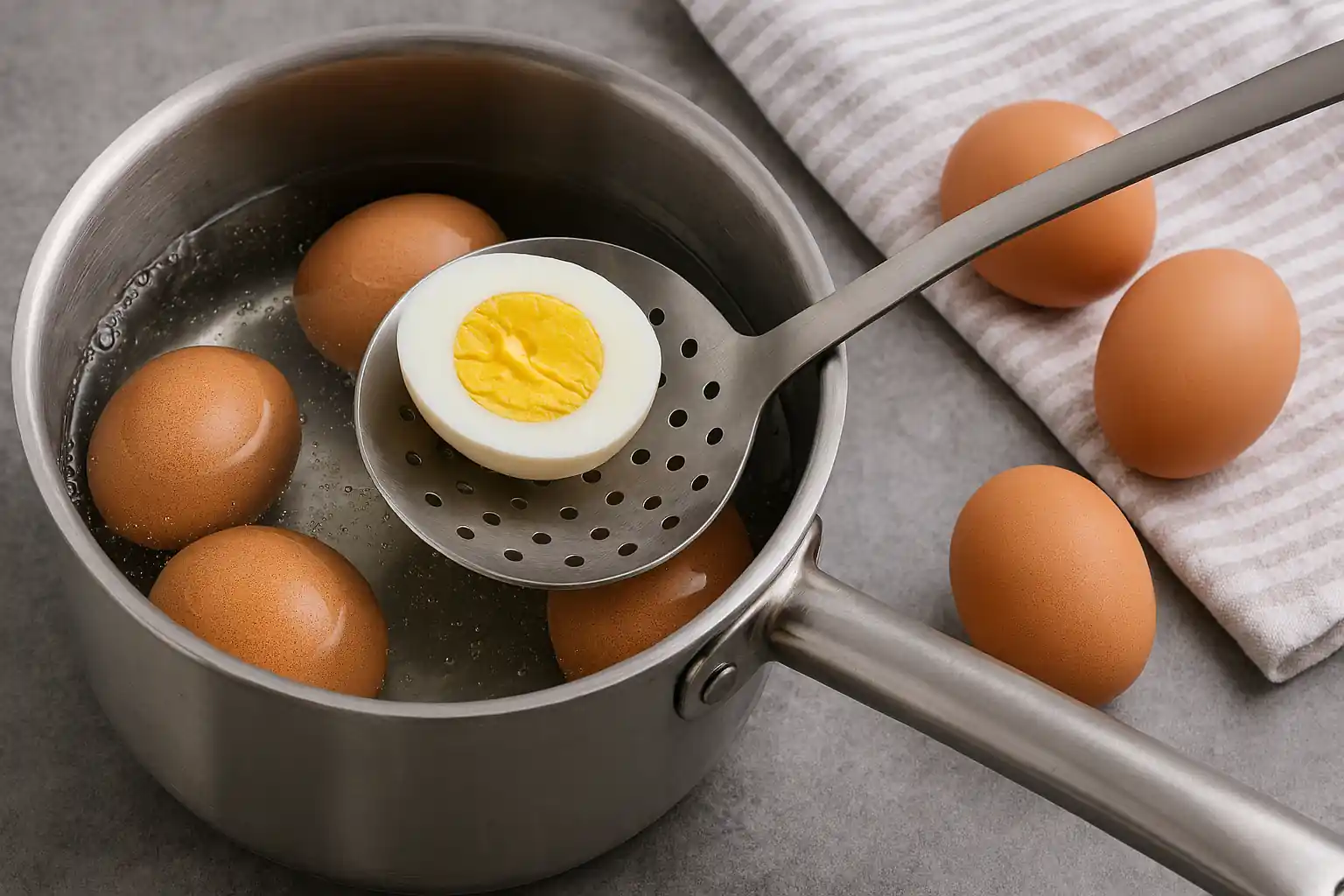Boiled Eggs Time: The Complete Guide to Perfect Hard Boiled and Soft Boiled Eggs
When it comes to quick, nutritious, and versatile foods, nothing quite compares to eggs. Whether you want to boil eggs for breakfast, prepare them for a protein-packed snack, or make deviled eggs for a party, knowing the right cooking method makes all the difference. Many people struggle with how long to boil eggs, how to avoid overcooking, and how to make them easier to peel. This comprehensive guide will cover everything you need to know about how to boil, hard boil, and soft boil eggs to get the perfect result every single time.
We’ll look at the science behind the cooking process, tips for preventing cracked shells, how to peel eggs easily, and how to store hard boiled eggs properly. By the end, you’ll be able to make hard boiled eggs or soft boiled eggs confidently, whether you’re cooking 6 eggs, 12 eggs, or more in the same pot.
Understanding the Basics: Why Boil Eggs?
Before diving into the exact steps to boil eggs, let’s understand why boiling is one of the most popular cooking methods for eggs.
-
Boiling eggs locks in nutrients without adding extra oil or fat.
-
Hard boil eggs create a firm egg white and a fully set yolk, making them ideal for egg salad, deviled eggs, and snacks.
-
Soft boiled eggs provide a runny yolk that pairs perfectly with toast or ramen.
-
Boil eggs in large batches, and you’ll have a versatile protein source ready to use in different recipes.
Boil eggs right, and you’ll always get the perfect balance of texture and taste.
How to Boil Eggs: The Starting Point
When you boil eggs, the main factors to consider are water temperature, timing, and how you cool the eggs after cooking. To get perfect eggs every single time, you need to follow a consistent cooking method.
Step 1: Place Eggs in Cold Water
Place the eggs in the pot and cover with cold water. Using cold tap water ensures that the eggs heat up gradually, reducing the chance that the eggs don’t crack.
Step 2: Bring the Water to a Gentle Boil
Set the pot over medium to high heat and wait for the water to boil. A gentle boil is better than a vigorous boil over high heat, as too much bubbling can make the eggs hit the sides of the pot and crack.
Step 3: Set a Timer
Once the water boils, lower the heat slightly, and set a timer according to how you like your eggs:
-
6 minutes for soft boiled eggs with runny yolk
-
8 minutes for jammy yolk
-
10 minutes for a firm but slightly creamy yolk
-
12 minutes for a fully set hard boiled egg
Hard Boil Eggs: The Classic Method
When most people talk about boiled eggs, they mean hard boiled eggs. To hard boil eggs perfectly, you need precision. If you overcook, you’ll end up with green rings around the yolk and rubbery egg whites.
Method for How to Hard Boil Eggs
-
Place eggs in the pot and cover with cold water.
-
Slowly bring the water to boil over medium-high heat.
-
Once the water boils, set a timer for 10 minutes for large eggs.
-
After the timer goes off, immediately transfer the eggs to an ice water bath. This helps stop the cooking process and prevents overcooking.
-
Let the eggs sit in the bowl of ice water for at least 5–10 minutes before peeling.
This method ensures perfect hard boiled eggs every single time.
Soft Boiled Eggs: The Delicate Approach
Soft boiled eggs have tender whites and soft, runny yolks. They’re great for dipping toast or adding to noodle soups.
Timing for Soft Boiled Eggs
-
6 minutes for soft boiled with runny yolk
-
7 minutes for a slightly thicker yolk
-
8 minutes for custard-like consistency
To make soft boiled eggs:
-
Place the eggs in cold water and bring to a gentle boil.
-
Set a timer as soon as the water boils.
-
Once the timer goes off, transfer the eggs to a large bowl of ice water to stop the cooking process.
The key to soft boiled is precision; even one extra minute can turn a soft boiled egg into a hard cooked egg.
Perfect Hard Boiled Egg: Tips and Tricks
If you want the perfect hard boiled egg, consistency is everything. Here are some tips that will help:
-
Use older eggs rather than fresh eggs. Older eggs are easier to peel.
-
Always transfer the eggs to an ice water bath after boiling. Ice water to stop the cooking process is essential.
-
Don’t let the eggs sit in the hot water longer than the timer indicates, or you risk overcooking.
-
For 12 eggs in the same pot, make sure the water fully covers the eggs.
A recipe for hard boiled eggs might look simple, but achieving eggs perfectly cooked every single time requires attention to these details.
Make Perfect Hard Boiled Eggs: Step-by-Step Guide
To make perfect hard boiled eggs:
-
Place the eggs in cold tap water in a pot.
-
Slowly bring to a boil over high heat.
-
Once the water boils, set a timer for 10 minutes for large eggs.
-
When the timer goes off, immediately transfer the eggs to an ice water bath.
-
Let the eggs sit in the ice water to stop the eggs from cooking further.
-
Peel once cool, or store hard boiled eggs in the fridge.
Following this method ensures you get perfect hard boiled every time.
How to Peel Hard Boiled Eggs Easily
Peeling can sometimes be the hardest part of making boiled eggs. Fresh eggs are often harder to peel, while older eggs are easier to peel.
Tips to Peel Hard Boiled Eggs
-
Place eggs in cold water first before boiling to help prevent cracks.
-
After boiling, transfer the eggs to a large bowl of ice water and let the eggs sit for at least 10 minutes.
-
Crack the end of the egg gently, then roll it on a hard surface.
-
Run cold water over the egg as you peel to help loosen the shell.
With these tricks, peeling eggs becomes quick and simple.
Storing Hard Boiled Eggs
Once you make hard boiled eggs, storing them properly is important for freshness and food safety.
-
Store hard boiled eggs in the refrigerator within two hours of cooking.
-
Keep them in a covered container to prevent absorbing odors.
-
Peeled eggs should be stored in a bowl of cold water, changed daily, to keep them fresh.
-
Unpeeled hard boiled eggs can last up to a week.
Common Problems When You Boil Eggs
Even when you follow the right method, problems can arise:
-
Eggs don’t crack: This is ideal. If an egg does crack, put the eggs gently in the water next time.
-
Overcook: Overcooked eggs will have gray-green yolks and rubbery whites.
-
Difficult to peel: This often happens with very fresh eggs.
-
Eggs come out undercooked: This means you didn’t let the eggs sit in the hot water long enough.
To avoid these issues, always use a timer, boil the eggs gently, and transfer the eggs to an ice bath right after cooking.
Alternative Cooking Methods for Eggs
Boiling isn’t the only way to cook eggs. You can also:
-
Steam eggs for easier peeling.
-
Make poached eggs for runny yolks without the shell.
-
Bake eggs in the oven for a large batch.
However, boiling remains the most reliable way to make hard cooked eggs.
Recipes Using Hard Boiled and Soft Boiled Eggs
Egg Salad
Chop hard boiled eggs, mix with mayonnaise, mustard, and seasonings for a classic sandwich filling.
Deviled Eggs
Make hard boiled eggs, cut in half, and fill the yolk mixture with spices and mayo.
Ramen with Soft Boiled Eggs
Top your noodles with 6 minutes for soft boiled eggs for a restaurant-style meal.
Wondering if your eggs are still fresh? Check out this Tell if Eggs Are Bad – Taste of Home Freshness Test and learn reliable ways to ensure your eggs are safe to use.
Final Thoughts on How to Boil Eggs
Learning how to boil eggs properly gives you a versatile ingredient that’s perfect every time. Whether you prefer soft boiled eggs with runny yolks or hard boil eggs for egg salad, following the right cooking process ensures you’ll never overcook or undercook again.
Always remember:
-
Start with cold water.
-
Set a timer.
-
Use ice water to stop the cooking process.
-
Peel under running cold water.
Once you master this, you’ll be able to make perfect hard boiled eggs and soft boiled eggs every single time, whether you’re cooking 6 eggs, 12 eggs, or eggs in the same pot for meal prep.

